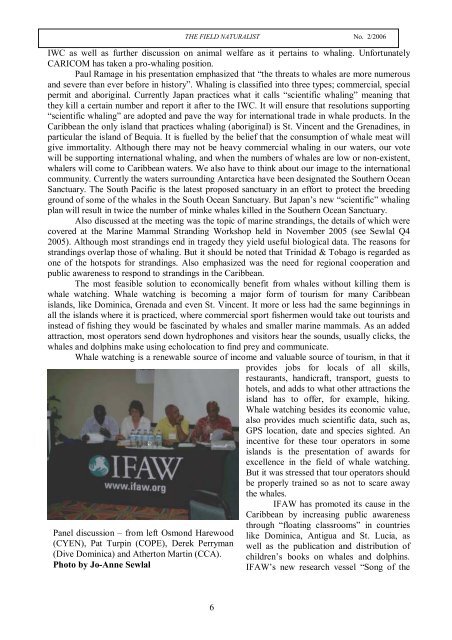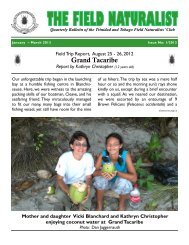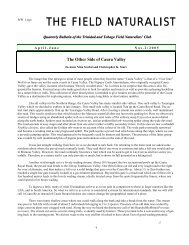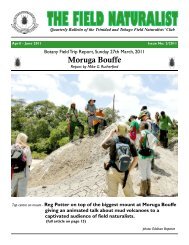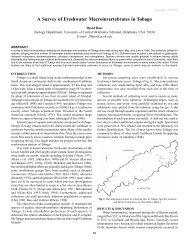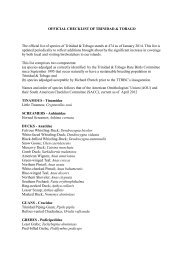Vol 2 - The Trinidad and Tobago Field Naturalists' Club
Vol 2 - The Trinidad and Tobago Field Naturalists' Club
Vol 2 - The Trinidad and Tobago Field Naturalists' Club
You also want an ePaper? Increase the reach of your titles
YUMPU automatically turns print PDFs into web optimized ePapers that Google loves.
THE FIELD NATURALIST No. 2/2006IWC as well as further discussion on animal welfare as it pertains to whaling. UnfortunatelyCARICOM has taken a pro-whaling position.Paul Ramage in his presentation emphasized that “the threats to whales are more numerous<strong>and</strong> severe than ever before in history”. Whaling is classified into three types; commercial, specialpermit <strong>and</strong> aboriginal. Currently Japan practices what it calls “scientific whaling” meaning thatthey kill a certain number <strong>and</strong> report it after to the IWC. It will ensure that resolutions supporting“scientific whaling” are adopted <strong>and</strong> pave the way for international trade in whale products. In theCaribbean the only isl<strong>and</strong> that practices whaling (aboriginal) is St. Vincent <strong>and</strong> the Grenadines, inparticular the isl<strong>and</strong> of Bequia. It is fuelled by the belief that the consumption of whale meat willgive immortality. Although there may not be heavy commercial whaling in our waters, our votewill be supporting international whaling, <strong>and</strong> when the numbers of whales are low or non-existent,whalers will come to Caribbean waters. We also have to think about our image to the internationalcommunity. Currently the waters surrounding Antarctica have been designated the Southern OceanSanctuary. <strong>The</strong> South Pacific is the latest proposed sanctuary in an effort to protect the breedingground of some of the whales in the South Ocean Sanctuary. But Japan’s new “scientific” whalingplan will result in twice the number of minke whales killed in the Southern Ocean Sanctuary.Also discussed at the meeting was the topic of marine str<strong>and</strong>ings, the details of which werecovered at the Marine Mammal Str<strong>and</strong>ing Workshop held in November 2005 (see Sewlal Q42005). Although most str<strong>and</strong>ings end in tragedy they yield useful biological data. <strong>The</strong> reasons forstr<strong>and</strong>ings overlap those of whaling. But it should be noted that <strong>Trinidad</strong> & <strong>Tobago</strong> is regarded asone of the hotspots for str<strong>and</strong>ings. Also emphasized was the need for regional cooperation <strong>and</strong>public awareness to respond to str<strong>and</strong>ings in the Caribbean.<strong>The</strong> most feasible solution to economically benefit from whales without killing them iswhale watching. Whale watching is becoming a major form of tourism for many Caribbeanisl<strong>and</strong>s, like Dominica, Grenada <strong>and</strong> even St. Vincent. It more or less had the same beginnings inall the isl<strong>and</strong>s where it is practiced, where commercial sport fishermen would take out tourists <strong>and</strong>instead of fishing they would be fascinated by whales <strong>and</strong> smaller marine mammals. As an addedattraction, most operators send down hydrophones <strong>and</strong> visitors hear the sounds, usually clicks, thewhales <strong>and</strong> dolphins make using echolocation to find prey <strong>and</strong> communicate.Whale watching is a renewable source of income <strong>and</strong> valuable source of tourism, in that itprovides jobs for locals of all skills,restaurants, h<strong>and</strong>icraft, transport, guests tohotels, <strong>and</strong> adds to what other attractions theisl<strong>and</strong> has to offer, for example, hiking.Whale watching besides its economic value,also provides much scientific data, such as,GPS location, date <strong>and</strong> species sighted. Anincentive for these tour operators in someisl<strong>and</strong>s is the presentation of awards forexcellence in the field of whale watching.But it was stressed that tour operators shouldbe properly trained so as not to scare awaythe whales.IFAW has promoted its cause in theCaribbean by increasing public awarenessPanel discussion – from left Osmond Harewood(CYEN), Pat Turpin (COPE), Derek Perryman(Dive Dominica) <strong>and</strong> Atherton Martin (CCA).Photo by Jo-Anne Sewlalthrough “floating classrooms” in countrieslike Dominica, Antigua <strong>and</strong> St. Lucia, aswell as the publication <strong>and</strong> distribution ofchildren’s books on whales <strong>and</strong> dolphins.IFAW’s new research vessel “Song of the6


